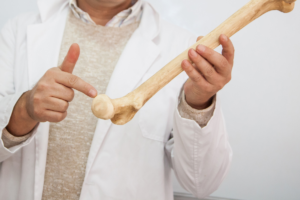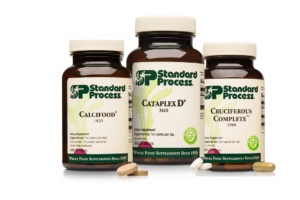By Claire Bacon, ACN, CNC
As we age, maintaining our bone health requires a more proactive effort. We want to stay healthy, even though our body is changing internally and externally. One of the highest risks for the elderly is falling and breaking a bone. If the bone is healthy, meaning dense enough as well as flexible, it should be able to withstand most falls.
Unhealthy bones can lead to serious problems, and can impact our quality of life. Our bones are living tissues. As we age, the structure of our bones changes, which can result in a loss of bone tissue. Bones feel solid on the outside, but the inside of a bone is actually filled with holes, somewhat like a honeycomb. Bone tissues are broken down and rebuilt on a continual basis, when everything is functioning properly. Yet as we age, we begin losing more bone than we can rebuild. Also, the tiny pores within our bones get larger, and the outer layer becomes thinner.

Loss of Bone Density Happens Because:
- An inactive lifestyle, particularly if missing weight-bearing activities
- Hormonal changes (diminishing estrogen)
- Lack of dietary calcium, and other minerals, like magnesium, vitamin D, boron, silica, strontium, sulfur and/or phosphorus
Without enough of the factors we need, our once hard bones can turn spongy, and can get worse over time. If the loss of bone density goes too far, it’s called osteoporosis. Over 10 million people nationwide are estimated to suffer from osteoporosis where the bones lose mass and become brittle and fractures are more likely. Other common conditions include:
- Osteoarthritis where the cartilage within the joints break down which causes pain and stiffness.
- Osteomalacia where the bones become soft due to problems with the metabolism of Vitamin D.
Resistance Exercise
As we get older, we should take a proactive role in maintaining our bones’ integrity and strength. We want our bones to be strong, but also flexible, and not brittle. For instance, in the event of a fall, we want our bones to have the proper flexibility under such a stress. To do this, we need to do weight-bearing exercises in addition to our regular cardio. In this way, we put stress on the bone to help build its strength and integrity.
You don’t necessarily need to hit the gym with a personal trainer. There are so many activities you can do that count as weight-bearing! Free weights, resistance bands, and body weight exercises are all excellent, but you have more choices, too. Think about walking, dancing, low-impact aerobics, elliptical training machines, stair climbing and even gardening to give strong physical benefits.
Strong Bones Need Estrogen
As we get older, it is a natural part of aging for the ovaries, and then later the adrenal glands, to diminish in estrogen production. Depending on how well we have supported our endocrine system through the years, we may find ourselves needing some herbal or bioidentical hormone support to maintain soft and supple tissues. This can get tricky, as most women don’t get adequate monitoring of their hormones, and it’s easy to accidentally down-regulate your hormone receptors. Having Dr. Bob on your team to assist with regular monitoring and herbal support can be a game-changer when it comes to how you feel!
Strong Bones Need Minerals
It is also a natural form of aging to lose the ability to produce strong stomach acid. Without sufficient hydrochloric acid, it becomes difficult to fully break down your food… and that means you’ll be at a disadvantage to absorb the minerals you need to fuel every tissue in the body.
Calcium is the most well-known mineral for supporting bone health. However, calcium metabolism is fairly complex, and many additional minerals are needed by the bones. First, you need to eat foods with all the nutrients you need. Then, your stomach acid should break down your foods completely. You need to have sufficient vitamin D to pull the calcium from your gut and put it in the bloodstream. You need enough essential fatty acids (fish oil) to put the calcium into the muscles and tissues. And you need enough vitamin C to drive it into the bones. Not to mention, the balance with magnesium and phosphorus needs to be in line. And other nutrients like boron, silica, strontium and sulfur need to be provided.
Easy tips for your daily routine:
Being active is so important! Incorporating 30 minutes of cardiovascular exercise, along with 15-30 minutes of resistance exercise several times a week, may be the number one thing to keep your bones strong. Strength training with weights or bands, or body weight activities like planks, pushups, or squats are all good. Even swimming provides good exercise for upper body strength.
Make sure you’re getting enough Vitamin D. Try to get 30 minutes in the sun – without sunscreen – to help maintain your Vitamin D levels. A brisk walk outside after lunch is a great way to work this into your lifestyle.
Support your endocrine hormones with herbs, when needed. Dr. Bob and our nutritional consultants can help you understand where your hormonal symptoms are coming from, and how they may impact your bone health. The most common herbs we find that benefit aging women’s bone health are Wild Yam, Black Cohosh, Epimedium, and Red Clover.
Thinking about your diet, pay special attention to getting enough calcium, magnesium, and other trace minerals. Incorporate leafy greens, wild caught fish, raw nuts, and seeds in your diet for good variety. More great sources of necessary minerals include:
- Kale
- Broccoli
- Collard greens
- Turnip greens
- Chinese cabbage
- Oranges
- Sesame seeds,
- Dairy products,
- Sardines,
- Salmon, and
- Beans.
Supplements for Strong Bones:
- Calcifood provides every single nutrient involved in building strong bones, and supports calcium absorption. This is a whole veal bone product, which has been dried at low temperature, maintaining the enzymatic properties of the nutrients.
- Vitamin D3 is crucial to building healthy, strong bones and assists with calcium absorption. Taking a supplement such as Cataplex D provides this vitamin year-round, even when the weather outdoors is not cooperating.
- Cruciferous Complete™ is made from Kale and Brussels sprouts. These plant foods support bone health and cellular turnover, which is necessary for proper growth and repair.

We know supplements can get confusing…
so watch Dr. Bacon with Chris Goodson from Standard Process, to help simplify them for you!
In Conclusion
It is never too late to start taking care of your bone health. A nutrient-dense diet, combined with resistance training and estrogen support (when needed) are a winning combination to keep you strong well into your golden years. By staying active with the right activities, and increasing your intake of minerals, you are providing a set of building blocks your body can use to rebuild and repair weakened bone tissue naturally.


